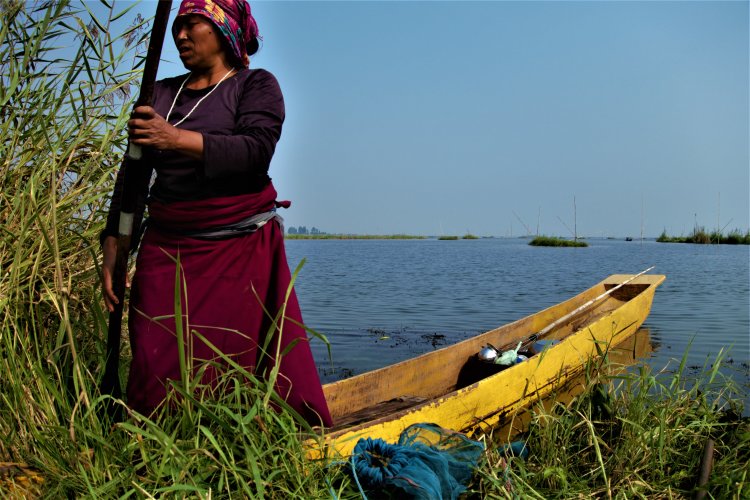Me: How it is like to have a house in the water?
Binasakhi: Firstly, it is not just a house but a home. And yes, I used to have a home in Loktak Lake. Now I am homeless and belonged to a displaced community. I do not have enough words to describe the feeling of having a home in water; I would just say that it is similar to what you feel about your home. The only difference is you live on land and I (used to) on water. 
Me: As you mentioned you and your community being displaced, how are you adjusting to land?
Binasakhi: It seems foreign. Of course, I would not deny that I have had no interaction with land, but I can never feel at home on land. At present, my family and I have taken refuge in one of my husband’s relatives. We have built a house, but I am afraid it can never become a home to me. I guess that is why I am still hopeful to return to the lake, to my home.
Me: Can you please tell me in brief on the reason for the displacement of your community?
Binasakhi: I might be incorrect but it all happened because of political affairs. We are an indigenous community of Loktak Lake and we are the children of the lake. However, the state government thinks otherwise. They have accused us of polluting the lake and evacuated us for preserving Loktak. We do not understand why we will pollute our lake, our mother, our homeland. If I am not wrong, displacement happened in late 2011. Along with many others, I too lost my home that day. They burnt down my house in front of my eyes. I was helpless and could only console myself with my never-ending tears.

Me: How is your family dealing with the whole situation?
Binasakhi: We are a fishing community and it is unimaginably difficult when we are not allowed to carry out our occupation in peace. My husband is old now and doesn’t have the physical strength to look out for other means of earning but to fish. He tries his best to spend as much time in the lake for a good catch. My two sons are helping me out with all the means possible, especially the younger son. He has become a matured way before his age because of all the unfortunate events. He is empathetic and I often fear that people will take advantage of him. We all fish but is not the same as before. Now we have restricted areas for fishing to the restricted method to what not. We are trying our best to survive on land, let’s just leave it to this.

Me: Can you share some memories of yours?
Binasakhi: Memories are what that is making me survive I would say. Every night I would sleep with the hope that I will wake up in my home in the lake, and all this has been just a dream. I start my day with disappointment. I also miss the times when I used to sail to and fro to drop my boys to school. I would feel elated when they chatter about their school. I remember those hard times, when I fed my boys the broth of boiling rice, as I couldn’t afford milk. I convinced them that we only get this kind of milk in the lake. And they used to drink it without further complaints. These all seem to be unhappy memories, but I was happy then, I am restless now. I guess a loss can only be truly understood when you lose something of yours.

Me: How are you?
Binasakhi: Gosh! That is a very difficult question. No one has ever asked me that before with such attention. Please do not get disappointed with my answer. I do not have an accurate ‘yes’ or ‘no’ answer to your question. With my age, my hope of returning to the lake is receding. Every morning I couldn’t wait to get done with my household chores and head to the lake. I often feel like I have abandoned my home and I get the feeling of home when I am in the lake. And the reason for spending as much time as possible in the lake, even though I do not have good catch nowadays. So to answer your question, I am adjusting-I am surviving-I am resilient, but I crave to live again.









